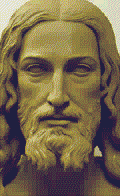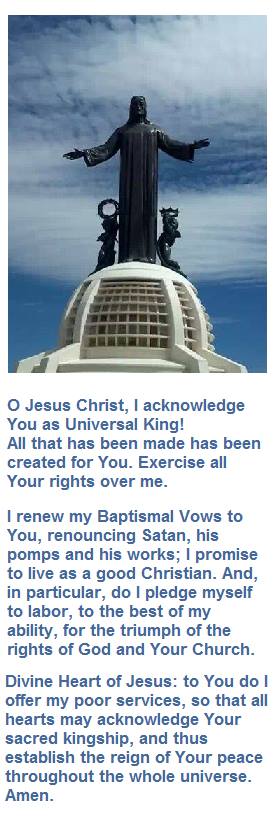Tuesday, August 30, 2016
THE EUCHARIST, A NEED OF OUR HEART
Fecisti nos ad Te, Deus!
Thou hast made us for Thee, O my God!
Why is Jesus Christ in the Eucharist? Many answers could be given to that question. The one that sums them all runs as follows: because He loves us and because He wants us to love Him. Love is the motive for the institution of the Eucharist.
Without the Eucharist Christ’s love would be nothing more for us than a lifeless love, a love of the past, which we would quickly forget and which it would be almost excusable for us to forget.
Love has its laws, its requirements, which the Eucharist alone fully satisfies. On account of the Eucharist Jesus has every right to be loved because in it He gives us a proof of infinite love.
Natural love, as God has placed it in our hearts, requires three things: mutual presence or fellowship of life, joint ownership of property, and perfect union.
I
The absence of a friend is friendship’s affliction, its torment. Separation weakens the strongest friendship and, if it is too prolonged, may end by destroying friendship altogether.
If our Lord is not present but keeps at a distance, our love for Him will suffer the dissolving effect of absence. It is in the nature of man and of his love to require, in order to live, the presence of the object of his love.
See what happened to the poor Apostles while our Lord was in the grave. The disciples at Emmaus admitted they had almost lost the faith; their good Master was no longer with them.
Ah! If our Lord had left us no other pledge of His love than Bethlehem and Calvary, how quickly we should have forgotten Him, the dear Savior! What indifference!
Love wants to see, to hear, to converse, to touch. Nothing can take the place of the beloved, neither memories, nor gifts, nor pictures; there is no life in these things.
Our Lord was well aware of it. Nothing could have taken the place of His Person. We must have our Lord Himself.
But His words? No! We can no longer be thrilled with them; we can no more hear the touching expression of them from the Savior’s own lips.
His Gospel? It is a testament.
Do not the Sacraments confer life? We need the Author of life to sustain it in us.
The Cross? No! Without Jesus it is a source of sadness.
But hope? Without Jesus it is an agony. Protestants have all these things, and yet how cold, how chilling is Protestantism!
Could Jesus have intended to leave us in the sad state of having to live and strive without Him?
Oh! We should be too unhappy without the presence of Jesus! Life would hardly be bearable if we had to go through it exiled and alone on earth, forced to deprive ourselves of earthly goods and of life’s consolations, while the worldling has everything his own way.
But with the Eucharist, with Jesus in our midst, often under the same roof, always there day and night, accessible to all, expecting everybody to come to His Home—–which is never closed—–admitting the poor and calling them with a marked preference, life loses much of its bitterness. He is the good Father in the midst of His children. That is fellowship of life with Jesus.
What a fellowship! It uplifts and ennobles us! How the Eucharist facilitates our relations of fellowship with Jesus Christ, our recourse to Heaven and to Jesus Himself.
That is truly the sweet companionship of a simple, loving, familiar, and intimate friendship.
We had need of it!
II
Love wants joint ownership of property. It wants to share fortune and misfortune. It is in the nature of love—–its instinct—–to give, and to give everything with joy and happiness.
Accordingly, with what prodigality and profusion Jesus in the Most Blessed Sacrament gives His merits, His graces, His very glory! How eager He is to give! Does He ever refuse anything?
And He gives Himself, to all and for always. He covers the world with consecrated Hosts.
He wants all His children to possess Him. Twelve baskets were left over after the multiplication of the five loaves in the desert. Everybody had to be fed.
Jesus Eucharistic would like to envelop the world in His sacramental cloud, and quicken all nations with this life-giving water which empties into the ocean of eternity, but only after having quenched the thirst of the last of the elect and given him strength.
Jesus Host is then ours, wholly ours.
III
The tendency of love—–its final tendency—–is the union of two beings who love each other, the fusion of two into one, of two hearts into one heart, of two minds into one mind, of two souls into one soul.
Listen to a mother as she presses her child to her breast: “I could eat him!”
Jesus is subject to this law of love which He Himself laid down. After having shared our condition, our life, He gives Himself to us in Communion; He dissolves us into Himself.
A Divine union of souls, ever more perfect, ever more intimate in proportion to the greater ardor of our desires. In Me manet, et Ego in illo. We abide in Him, He abides in us. We are one with Him until the ineffable union that was begun here below by grace and perfected by the Eucharist is consummated in Heaven in an eternal and glorious union.
Love lives therefore with Jesus present in the Most Blessed Sacrament. It shares all that belongs to Jesus. It is one with Jesus.
The demands of our heart are satisfied; it cannot ask for anything else.
Sunday, August 28, 2016
Friday, August 26, 2016
Wednesday, August 24, 2016
A "Christian" Who Takes Pride in Having God as a Father, but Refuses to Love the Mother of God and Recognize Her as Our Mother, is an Impostor
Represented by St. John at Calvary, we received as a heritage from Christ on the Cross His own Mother, whom He loved and worshiped very deeply: "When Jesus therefore had seen His mother and the disciple standing whom he loved, He saith to his mother: 'Woman, behold thy son'. After that, He saith to the disciple: 'Behold thy mother'". (Jn. 19, 26-27).
Monday, August 22, 2016
Friday, August 19, 2016
March and Mass of Reparation in Response to a Black “Mass” in Oklahoma City
Last August 15, the Feast of the Assumption of the Blessed Virgin Mary was celebrated throughout the world. But in Oklahoma City a Black Mass took place that same day, organized by a well-known Satanist group, which picked that specific date as provocation.
Despite the protests of hundreds of citizens, the City of Oklahoma allowed this blasphemous act to take place in a public place, claiming that it had met all the necessary requirements for its approval.
However, even though the Satanists got their way and regrettably were able to perform the black mass, the attendance was not as good as they expected, although they did desecrate an image of the Virgin Mary, wich is very serious. In fact, it was a relative failure because only very few people attended. The organizer of the event, Adam Daniels, who is a convicted sex offender, attributed this to the response of the believers of the city.
One of the most moving moments took place when a police sergeant, who was on duty, joined to the march. Afterwards, he prayed for police officers and members of the army, which caused the ovation of the people present.
The Society of St. Pius X and its Oklahoma City chapel, St. Michael’s, organized a public Mass of Reparation at noon on August 15, the Assumption of Mary, in response to a black mass that was performed in the Oklahoma City Civic Center Music Hall later that night with the permission of the city officials. This blasphemous mockery of the Holy Sacrifice of the Mass was reportedly accompanied by another blasphemous ritual that desecrated, in a most vile way, an image of Our Lady. The Mass was offered on the grounds of the Civic Center Music Hall in which the blasphemy would occur later that day. Father Patrick McBride, who was the celebrant of the Mass, explained in a press release the reason for offering the Mass on the grounds outside the Civic Center:
“In 2014, we offered in a nearby downtown hotel a public Mass of Reparation in atonement for the first publicly performed black mass. This time we wanted to bring the Holy Sacrifice of the Mass to the very ground on which these blasphemies will occur. We will raise up to heaven Our Lord’s Most Precious Blood in reparation for the insults that He and His Blessed Mother will receive from these people who regrettably respond to His loving embrace with insults and outrage. We particularly implore the protection of the Blessed Mother as we make reparation to Her Divine Son."
Father McBride explained in his sermon that we brought Calvary to the Civic Center in reparation. He provided a moving meditation on the last sermon of Our Lord preached from the Cross and explained how His words spoke across time to this act of Reparation. Whereas the Satanists' acts were filled with hatred, Father’s sermon spoke of the love and mercy of God which remains available to anyone who repents like the good thief. Like his Master, Father McBride, who acted in the Person of Christ, met their hatred with the prayer, “Father forgive them for they know not what they do.” In the end he exhorted the Faithful to the spiritual peace attained by taking their sacrifices of the day and all those they would make throughout the recently launched Rosary Crusade and offer them to the Eternal Father: “Into Thy Hands O Lord, I commend my Spirit.”
In addition to raising the Precious Blood of Christ over this public place which hosted blasphemy, all those gathered offered our Blessed Mother a bouquet of her holy rosary and recited the Act of Reparation to the Sacred Heart before the Blessed Sacrament resting on the altar.
The precious image of Our Lady of Fatima was transported to the Mass from Canada by volunteers of the Fatima Center who spent four days driving there and back. Our Lady was thus carried into the sanctuary in a shower of roses and escorted by her devoted sons who served to give greater honor to their Mother.
Different Catholic groups joined to this act. Among these groups, there was the TFP Student Action, who made the following video:
Sources: Actuall.com, SSPX.org, Adelante la Fe
Wednesday, August 17, 2016
A Historic Document: Filial Plea to Pope Francis from 16 Important Catholic Leaders (video)
“A great number of souls are in danger of eternal damnation”, they warn.
16 important Catholic pro-life leaders, faithfully plead Pope Francis to put an end to the doctrinal confusion, to restore the clarity of the Magisterium and to reaffirm the immutable teachings taught by Christ and His Church, which are unchangeable and perennial.
They say that: “there is the possibility that a great number of souls get lost eternally” if the errors and ambiguities contained in the Apostolic Exhortation, Amoris laetitia, are not corrected. This is an exhortation that did not use the prerogative of infallibility by not maintaining integrity the doctrine taught by Christ, which have always been guarded by the Catholic Church.
Monday, August 15, 2016
The Feast of the Assumption
The last dogma of Faith solemnly proclaimed by the Catholic Church is the Assumption of the Virgin Mary, in body and soul into Heaven. In order to substantiate this definition, the Magisterium took into account the consensus of the faithful, the great number of temples and pictures that honored this mystery; the dioceses and cities that bear it as their patron; the liturgical feast celebrated in its honor, since ancient times, in both the East and the West; the constant teaching of the Holy Fathers and Doctors of the Church, and the doctrine of well-known theologians.
The Holy Scripture shows the Mother of the Lord always connected to the person and fate of her divine Son. Victor of the law of sin by her Immaculate Conception (a privilege that her Son conquered for her through His blood), the Faith of the Church did not hesitate to expand this solidarity of fates between them, asserting that she, just as her Son, also conquered the power of death and the corruption of the tomb.
In view of this situation, not only the soul of the Blessed Virgin Mary already enjoys the vision of God: her body aslo, after a momentary dormition, shares the qualities of the glorious body of risen Christ. Her entire person: soul, body, spirit and heart, has entered triumphantly into Heaven, anticipating what the chosen hope to enjoy on the Final Day.
Popular worship usually refers to this Feast as “Transit”. It is, indeed, a transition, an Easter, a victorious progress. The mere name of the mystery reminds us that life does not stop: its immanent law is to grow, flourish and improve. Its other name, “Assumption”, proposes two ideas: our path is and ascending one, without any other limit or destiny than Heaven; and our ascension is possible because One who is stronger than us, attracts us upwards.
The Blessed Virgin Mary, assumed body and soul into Heaven, thus becomes an icon of the Church, which moves forward with hope and unwavering nostalgia toward the joyful reunification with the Husband. Looking at this mystery, calling its name, and celebrating it implies a victorious transition from anguish to hope, from loneliness to communion, from dismay to peace, from tediousness and nausea to happiness and beauty, from temporary perspectives to certainties and eternal possessions: from death to life.
The first level in which this paschal transit should materialize is in our conversations. In our families, in our education, and in all our social communications, the elevation of the soul to those subjects and values, which just like her do not and cannot die, must open up and strengthen. Man is much more than a chain of miseries, easements and frivolities of daily life. He hungers for God, and has thirst for the infinite. Those teachers, preachers and communicators who rightly open up these spaces and enable such elevation of the soul provide an invaluable service and honor the dignity of the human being.
The second level of elevation lies in our aspirations. We tend to settle for whatever we have, instead of risking ourselves in the hope of what will come, which will be better. Celebrating the Assumption, not only every August 15, but every Fourth Glorious Mystery of the Rosary, implies an ongoing commitment of excellence and spiritual aristocracy. It means leveling up, and getting used to persevere in the ascending path to Heaven. It is the law of inertia of love, that once it begins always wants more.
And the third level of elevation is rising from where our depressions lie. Those who worship the Assumption rejoice in the fact of knowing they are called to inject in our lives a vital tone of joy and optimism. Contemplating the Blessed Virgin Mary, they see themselves singing the Magnificat which announces God’s victories. They rest and recreate on the certainty that there is in Heaven a Mother who calls them by their name and covers them with her mantle.
Fr. Raúl Hasbún
Sunday, August 14, 2016
Saturday, August 13, 2016
Prayer reminder for the thirteenth day of each month
We remind you that today, as every 13th day of each month, we will join together in prayer for five minutes, for the intentions that are explained in the following link: http://www.catholicityblog.com/2016/01/appeal-to-our-friendsreaders.html
Wednesday, August 10, 2016
"One of Hillary Clinton's Role Model is Someone Who Admires Lucifer": Ben Carson
When she was a student, Hillary Clinton wrote a thesis about Saul Alinsky entitled "An Analysis of the Alinsky Model"
SOURCE: http://gaceta.es/noticias/existe-algun-vinculo-hillary-clinton-lucifer-24072016-1006
RELATED TOPICS (click here): http://www.catholicityblog.com/2016/05/hillary-clinton-seeks-to-give-to-caesar.html
Friday, August 5, 2016
Tuesday, August 2, 2016
Subscribe to:
Posts (Atom)

























.jpeg)









